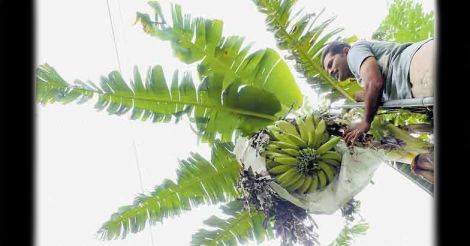Thrissur: Without paying heed to advice from his counterparts, who use chemical fertilizers, Thanikudam Thruppakal Girish Kumar, a Kerala farmer, migrated to using organic one created in the backyard with confidence. And he has been rewarded with 'gold'.
Girish, who used chemical fertilizers until two years ago, shifted to bio-farming after getting inspired by agriculturist Subhash Palekar's farming lessons. He mixed cow dung and urine (cow manure) to fertilize his plantain crops, a move which was laughed off by many of his farmer friends.
Girish has rubber, coconut, tapioca and banana in his 6-acre farm. At a time when farmers believe that banana yield is not possible without chemical fertilizers and pesticides, Girish has produced over 250 chengalikodan (a banana variety originated in Chengazhikodu village here) through bio-farming.
Cow manure making
» In pits 6 feet apart, Girish fills green leaves, oil cake and goat excreta as base manure. Then the pit is exposed to sunlight for a month, watering it on alternate days.
» Before the plant bears fruit, use the bio-fertilizer called Jeevamrutham three times.
How to make Jeevamrutham: The bio-pesticide is made by mixing cow's dung and urine with jaggery, pea powder and a fistful of chemical-free soil fertilizers.
» When the fruit are three weeks ripe, it is covered with a sack and banana leaves. This is essential to guard it from birds, as well as helps maintain chengalikodan's natural color. Fruits are also covered with soil to keep off worms.
According to Girish, one bunch of banana weighs average 14 kilos and fetches more money as it is bio-product. Girish's wife Manisha Pangil, a guide at Appan Thampuran Museum in Thrissur, assists him in farming along with their children.
Powered by Chuttuvattom: Click to read story in Malayalam

























